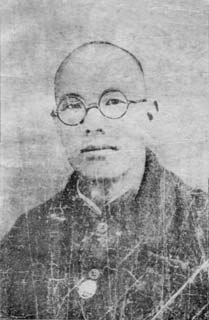He was the son of Chen Deng Ke, and the grandson of Chen Yannien. He was a sickly child, and almost died in infancy. His father taught him Taiji in hopes of improving his health. He travelled with his father on business in the Shanxi/Gansu regions as a teenager, continuing his studies with him. After the death of his father, he continued his studies with Chen Yanxi, Chen Xin, and Chen Fake. He achieved a high level of skill. In 1914, dissatisfied with poor economic conditions in the village, he left Chenjiagou and journeyed to Gansu and Shanxi seeking business opportunities. It was during this period that he began teaching Taiji. In 1927, fearing for the safety of his elderly mother during the turbulent warlord era, he returned home to Chenjiagou, and to teach at the Wenxian Martial Arts Academy alongside his uncle and teacher, Chen Fake. In 1928 he was hired by a famous pharmacy in Beijing as a guard. He kept a low profile, wishing to avoid conflict with other martial artists. However, a newspaper account was published mentioning his skill, and Zhaopi was challenged. As a result, he set up a lei tai (challenge platform) by one of the city gates, and for seventeen days accepted challenges from over two hundred people, defeating all. As a result, his reputation grew greatly. He was offered many invitations from government agencies and universities to teach. In 1930 he was invited by the mayor of Nanjing (the capital of china at the time) to teach for the city government, as well as to accept a position at the Nanjing Martial Arts Academy ( a prestigious martial arts university of the period). In 1933 he was elected to the position of a referee at the National athletic competitions. It was during this period that he published his work Chen Shih Tai Chi Chuan Hui Tsung, based on the earlier works of his teacher, Chen Xin. It was also during this period that he created the Double Straight Sword form, and also expanded the single broadsword form to 23 postures as it is taught today. Following the fall of Nanjing to the Japanese in 1937, Zhaopei left the city, unwilling to serve under the invaders. He travelled to various areas, and was an instructor of the broadsword to Chinese troops under General Fan Tinglan. By 1940 he was teaching in Loyang. In 1942 he was invited to Xian to teach at the Yellow River Hydro-Power Electric Agency. Following the conclusion of World War ll, he moved to Kaifeng, Henan in 1946 with the agency as it relocated. In 1958, he visited Chenjiagou, and was alarmed at the state of the art of Taiji in the village. War, flood, draught, and locusts had devastated the agricultural village. There had been a diaspora of teachers and students from the area, seeking a better life elsewhere. The art was in danger of dying out in it's birthplace. Chen Zhaopei took it upon himself to revitalize the art. He retired early from his job at Yellow River Hydro-Power Electric Agency, and used his funds to set up a training hall at Chenjiagou. Indeed, he is remembered by exponents of the 19th generation as the man who sparked a rennaisance of Taijiquan in Chenjiagou, teaching such modern day masters as Chen Xiaowang, Chen Zhenglei, Wang Xian, and Zhu Tiancai. It is worth noting that, although persecuted during the Cultural Revolution (despite being a member of the CCP) for his teaching of the traditional art, he persevered, instructing his students in secret, and enduring public ridicule. His school, located in his home, became the inspiration and the nucleus for the Chenjiagou Taiji Promotion Center. Gradually, as the Cultural Revolution waned, practice of Taiji was more politically accepted. Students began practicing publicly again. In 1972, he trained his students intensely for competition in the Henan Province Martial Arts Meet. They were successful, and were chosen to represent the province at the National Competitions. Zhaopei, now almost eighty, was too old for such a demanding schedule, and was admitted to the hospital. He died at the end of the year of complications from hepatitis. He is revered by practitioners of the art for his unselfish contributions to his familys legacy. Click here to read a memoir of Chen Zhao Pei by his son, Chen Ke Sen |
| Tales of the Masters: Chen Zhao Pei |
 |